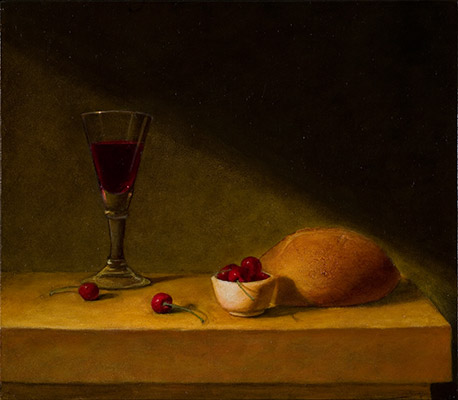Any way for this class I had to do a paper that changed my thinking on that particular topic. It did what a paper is supposed to do. bring a student in contact with writers and thinkers on a subject and causes them to think about the subject in a new way.
 The Subject was transubstantiation and I learned more about the Eucharist through that paper then a lifetime of taking communion in church. Transubstantiation is the western church, or Roman, understanding of what happens during the Eucharist. that the bread and wine become the literal body and blood of Christ. the idea is that the substances change but the accidents stay the same that is why you the wine still tastes like wine and the bread still tastes like bread.
The Subject was transubstantiation and I learned more about the Eucharist through that paper then a lifetime of taking communion in church. Transubstantiation is the western church, or Roman, understanding of what happens during the Eucharist. that the bread and wine become the literal body and blood of Christ. the idea is that the substances change but the accidents stay the same that is why you the wine still tastes like wine and the bread still tastes like bread.I say wine because many* denominations who grape juice or something else for the most part subscribe to the Calvin and Zwinglian understanding that the communion is just a Memorial. And this a view that I have found dissatisfying for two reasons. first it cheapens the celebration of the Eucharist so that it loses its importance and congregations it only gets celebrated once a quarter. Secondly it removes us from the mystery of what is happening at the table. It is called Communion because we commune with God. it becomes one of those things we do.
The idea of Transubstantiation gives a reverence and awe to the elements of communion that is lost in the memorialistic understanding. However there is one other understanding, (and I don't mean the Lutheran idea of Consubstantiation) the more eastern idea of mystery. they don't try and explain how the bread it still bread and yet the body of Christ or how the wine is still wine yet also the blood of Christ. It is a mystery, but it is true. this may be dissatisfying. we in the western world want to know how and why. but this is what i learned through this paper that still effects me today, the Lord's table is a tangible place to meet with God in a Tangible way. When I come to communion I acknowledge the fact that I am not perfect, that I have failed, but by taking part in Christ's holy sacrifice I am renewed and cleansed.
I will end today with the Prayer of Humble access which is said as a congregation every Sunday at my church:
Most Merciful Lord, your love compels us to come in. our hands were unclean, our hearts unprepared; we were not even fit to eat the crumbs from under your table. But you, Lord, are the God of our salvation. and you share your bread with sinners. So cleanse and feed us withte precious Body and Blood of your Son, in these Holy Mysteries, that he may live in us and we in him; and that we with the whole company of christ, may sit and eat in your kingdom. Amen


1 comment:
* a friend pointed out that this was a little over simplified to say that all denominations who use juice are this way.
Post a Comment